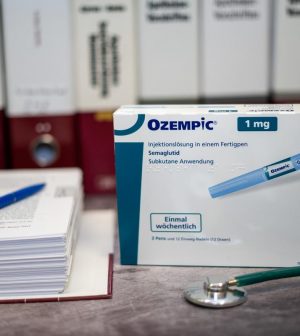- Could Your Grocery Store Meat Be Causing Recurring UTIs?
- Are You Making This Expensive Thermostat Error This Winter?
- Recognizing the Signs of Hypothyroidism
- 10 Strategies to Overcome Insomnia
- Could Artificial Sweeteners Be Aging the Brain Faster?
- Techniques for Soothing Your Nervous System
- Does the Water in Your House Smell Funny? Here’s Why
- Can a Daily Dose of Apple Cider Vinegar Actually Aid Weight Loss?
- 6 Health Beverages That Can Actually Spike Your Blood Sugar
- Treatment Options for Social Anxiety Disorder
Cost Has Many Going Around Doctors to Get Weight-Loss Meds

Wegovy, Zepbound and other cutting-edge weight-loss drugs can be tough to get these days.
They’re in short supply, and often too expensive to afford without insurance coverage.
Because of these barriers, many people are doing an end-run around their doctor’s office, reaching out to potentially unreliable sources that promise to set them up with the drugs, a new survey finds.
About 1 in 4 people surveyed said they would consider using an injectable weight-loss drug without consulting their doctor, Ohio State University researchers report.
Their reasons for skipping the doctor include:
-
Lower cost (18%)
-
Not covered by insurance (15%)
-
Unable to get a prescription from their doctor (9%)
-
Lack of availability through a pharmacy (6%)
However, unlicensed online pharmacies or dodgy telehealth sites could be risky places to turn to for these drugs, experts said.
“It’s really important for those who want to lose weight to first discuss options with their doctor,” said Dr. Shengyi Mao, an internal medicine specialist with Ohio State.
“It is not one-size-fits-all, and every medication can have risks and side effects,” Mao added in a university news release. “A trusted doctor can go through a patient’s medical history and current medications to assess their particular risks and benefits.”
The U.S. Food and Drug Administration has issued two warnings this year about compounded semaglutide, which has caused dosing errors that resulted in severe nausea, vomiting, hypoglycemia and hospitalizations.
Drug compounding involves combining, mixing or altering drugs to create a medication tailored to the needs of an individual patient. The problem is, compounding a drug can make it tough to accurately calculate the proper dose a person should take.
Some compounders are also using semaglutide salt in their concoctions, which is a different active ingredient than the one used in Wegovy and Ozempic.
The FDA also is investigating reports of counterfeit Ozempic being sold in the United States, researchers noted.
“Obesity is a serious and complex chronic disease and shouldn’t be addressed in a one-size-fits-all approach,” Mao said. “That’s why a comprehensive weight management program is often the best choice because losing weight and keeping it off requires a lifestyle change and lifelong commitment.”
“These weight-loss drugs may be effective for some people, but they can cause serious side effects and the weight may return after they stop taking them,” Mao concluded.
The survey involved 1,006 people polled Aug. 16-18 via web and telephone.
More information
The U.S. Food and Drug Administration has more on compounded semaglutide.
SOURCE: Ohio State University, news release, Sept. 17, 2024
Source: HealthDay
Copyright © 2026 HealthDay. All rights reserved.










